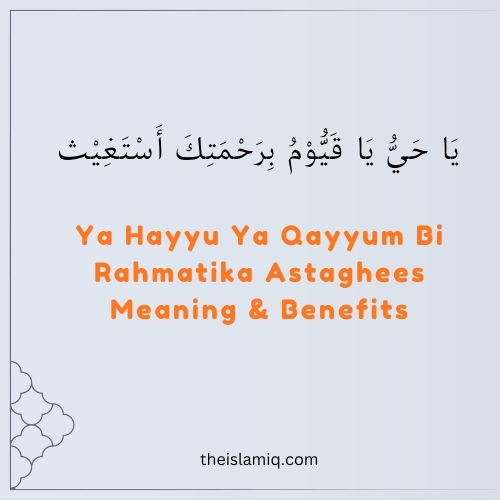Meaning of Dua La Hawla Wala Quwwata Illa Billah
In Islamic spirituality, few phrases are as significant as “la hawla wala quwwata illa billah” or “لَا حَوْلَ وَلَا قُوَّةَ إِلَّا بِالله” This powerful declaration, deeply rooted in the faith, influences the lives of countless Muslims worldwide. As you explore its meaning and implications, you’ll discover how this simple yet profound statement reflects the core principles of Islam, emphasizing Allah’s oneness and believers’ complete dependence on His power and will.
Table of Contents
Meaning of La Hawla Wala Quwwata Illa Billah
La Hawla Wala Quwwata In Arabic
لا حَوْلَ وَلا قُوَّةَ إِلا بِالله
Arabic Pronunciation
The phrase “la hawla wala quwwata illa billah” is pronounced as follows: laa hawla wa laa quwwata illaa billaah. This powerful declaration is deeply rooted in the Islamic faith and holds great significance for Muslims worldwide.
English Translation
The English translation of “la hawla wala quwwata illa billah” is “There is no power or strength except through Allah.” However, this simple translation doesn’t fully capture the depth and grandeur of this magnificent phrase.
Deeper Analysis of Each Word
To truly understand the meaning of “la hawla wala quwwata illa billah,” you need to break it down word by word:
- La: This means “no” or “none.”
- Hawla: This refers to change, transformation, or movement.
- Wala: This means “nor” or “and not.”
- Quwwata: This stands for strength or ability.
- Illa: This means “except” or “but.”
- Billah: This means “with Allah” or “by Allah.”
These words create a powerful statement acknowledging that all change, transformation, and strength come from Allah alone. This phrase emphasizes the complete dependence of believers on Allah’s power and will, reflecting the core principle of the Oneness of Allah in Islam.
When to Recite This Phrase
During Times of Hardship
When facing difficult circumstances, the phrase “la hawla wala quwwata illa billah” becomes a powerful tool. It has an amazing effect in helping you bear hardships and confront challenging situations. This declaration reminds you to rely on faith and trust in Allah during tough times. By uttering these words, you acknowledge your limitations and seek divine guidance. It’s particularly effective in removing sickness, sadness, and anxiety. The next time you feel overwhelmed, try regulating your breathing while repeating this phrase, absorbing its powerful meaning.
After the Adhan (أذان)
After hearing the call to prayer, repeating what the caller says is recommended. However, when you hear “hayy ‘ala al-salah” and “hayy ‘ala al-falah,” you should respond with “la hawla wala quwwata illa billah.” This practice emphasizes that no power works except by Allah’s permission. It’s a moment to reflect on your dependence on Allah’s will and strength.
When Leaving the House
Reciting “la hawla wala quwwata illa billah” as you step out of your home is a protective shield. The Prophet Muhammad (صلى الله عليه وسلم) taught that when you leave your house and say this phrase, the angels respond that you are guided, defended, and protected. This practice helps you start your day with a strong connection to Allah, seeking His guidance and protection in all your affairs.
Historical Context of the Phrase
The phrase “la hawla wala quwwata illa billah” has deep roots in Islamic tradition, reflecting the core principles of faith and submission to Allah. This powerful declaration has been a cornerstone of Muslim spirituality for centuries, emphasizing the complete dependence of believers on Allah’s will and strength.
Origin in Islamic Tradition
The origin of “la hawla wala quwwata illa billah” can be traced back to the early days of Islam. It embodies the concept of tawheed, or the oneness of Allah, which is fundamental to Islamic belief. This phrase reminds us that all power and ability come from Allah alone, reinforcing the idea of complete reliance on Him.
Mentions in Hadith
Here are some hadith themes that align with the concept expressed in “La hawla wa la quwwata illa billah”:
- Trust in Allah:
- Narrated by Abu Hurairah: The Prophet (peace be upon him) said, “If any of you believes in Allah and the Day of Judgment, let him speak good or remain silent.” (Sahih Bukhari)
- Narrated by Abu Sa’id al-Khudri: The Prophet (peace be upon him) said, “The believer is the one who trusts in Allah and hopes for His reward.” (Sahih Muslim)
- Seeking Refuge in Allah:
- Narrated by Abu Hurairah: The Prophet (peace be upon him) said, “If any of you fears poverty, let him seek refuge in Allah. If any of you fears death, let him seek refuge in Allah.” (Sahih Bukhari)
- Narrated by Abu Sa’id al-Khudri: The Prophet (peace be upon him) said, “The believer is the one who seeks refuge in Allah from the evil of His creation.” (Sahih Muslim)
- Submission to Allah’s Will:
- Narrated by Abu Hurairah: The Prophet (peace be upon him) said, “Whoever says, ‘There is no god but Allah,’ and is sincere in his heart, Paradise is his due.” (Sahih Bukhari)
- Narrated by Abu Sa’id al-Khudri: The Prophet (peace be upon him) said, “The believer is the one who is content with what Allah has decreed for him.” (Sahih Muslim)
Usage by Early Muslims
Early Muslims frequently used this phrase daily, recognizing its transformative power. They understood that by uttering these words, they acknowledged their powerlessness and sought Allah’s help. This practice helped them cultivate humility, strengthen their faith, and find comfort in times of hardship.
Benefits of Reciting La Hawla Wala Quwwata Illa Billah
Spiritual Rewards
Reciting “la hawla wala quwwata illa billah” brings numerous spiritual benefits. It’s considered one of the Paradise treasures, as Prophet Muhammad mentioned (peace be upon him). Every time you say this phrase, you’re rewarded with a tree planted in Paradise. This powerful declaration acknowledges that all strength and power come from Allah alone, deepening your connection with Him.
Psychological Impact
The phrase “la hawla wala quwwata illa billah” has an amazing effect on your mental well-being. It helps you endure difficulties and hardships, providing strength in challenging situations. When you’re feeling anxious, worried, or sad, repeating this phrase can strongly impact repelling these negative emotions. By recognizing Allah’s power and your dependence on Him, you gain a sense of peace and tranquillity.
Protection from Evil
“la hawla wala quwwata illa billah” is a powerful shield against various forms of harm. It’s particularly effective in repelling the devil and protecting you from evil influences. When you leave your house and recite this phrase, it’s said that you’ll be guided, defended, and protected throughout your day. This practice helps you start your day with a strong connection to Allah, seeking His guidance and protection in all your affairs.
Incorporating the Phrase in Daily Life
As a Form of Dhikr
Incorporating “la hawla wala quwwata illa billah” into your daily routine can bring a sense of calm and reliance on Allah. This powerful phrase serves as a form of dhikr, or remembrance of Allah. By reciting it frequently, you acknowledge that all strength and power come from Allah alone, deepening your connection with Him. The Prophet Muhammad (peace be upon him) encouraged believers to say this phrase often, likening it to a treasure from Paradise. You can make it a habit to recite “la hawla wala quwwata illa billah” a hundred or even a thousand times throughout your day, reaping the spiritual rewards and strengthening your faith.
In Times of Stress or Anxiety
“la hawla wala quwwata illa billah” holds deep significance during challenging times. When you’re feeling anxious, worried, or sad, repeating this phrase can strongly repel these negative emotions. It serves as a reminder that Allah controls all situations, helping you find inner peace and tranquillity. You can navigate difficulties with greater resilience and faith by recognizing your limitations and seeking Allah’s help.
During Decision-Making
When faced with important decisions, reciting “la hawla wala quwwata illa billah” can provide guidance and strength. This practice helps you acknowledge that true power lies with Allah, encouraging you to seek His guidance in your choices. By saying this phrase before making decisions, you remind yourself to trust Allah’s wisdom and plan. This can lead to more mindful decision-making, aligning your choices with your faith and values.
Conclusion
The phrase “la hawla wala quwwata illa billah” has a profound impact on Muslims’ spiritual lives. It is a powerful reminder of Allah’s omnipotence and the believer’s complete reliance on Him. By reciting these words during hardships, after hearing the call to prayer, or when leaving the house, Muslims strengthen their faith and seek divine guidance and protection in all aspects of their lives.
To wrap up, the deep meaning behind “la hawla wala quwwata illa billah” reflects the core principles of Islam, emphasizing Allah’s oneness and the importance of trusting in His will. Its regular recitation can help build resilience, foster humility, and deepen one’s connection with Allah. By understanding and embracing this phrase, Muslims can find comfort and strength in their daily lives, always remembering that true power and ability come from Allah alone.
Read Also:
FAQs
- What is the significance of the phrase “La Hawla Wala Quwwata Illa BillAhil Aliyyil Azeem”?
- The phrase “La Hawla Wala Quwwata Illa BillAhil Aliyyil Azeem” acknowledges a person’s reliance on Allah’s help and support, affirming that they are incapable of any power or strength without Allah.
- What are the spiritual benefits of reciting “La Hawla wa La Quwwata Illa BillAhil Aliyyil Azeem”?
- According to Islamic teachings, reciting “La Hawla wa La Quwwata Illa BillAhil Aliyyil Azeem” is highly beneficial. The Prophet Muhammad mentioned that it is one of the gateways to paradise, and reciting it can bring divine assistance in the form of good health or a cure, as noted in the Hadith of Tirmidhi.
- How is “La Hawla Wala Quwwata Illa Billahil Aliyyil Azeem” expressed in Urdu?
- In Urdu, the phrase is written as “لا حول ولا قوة إلا بالله العلي العظيم,” which translates to “There is no power nor strength except by God.”
- What does the phrase “Ma sha Allah La Quwwata Illa Billah” mean?
- “Ma sha Allah La Quwwata Illa Billah” translates to “Whatever God wills, there is no power or strength except through Allah.” This phrase is often used to acknowledge Allah’s will in unfolding events.






